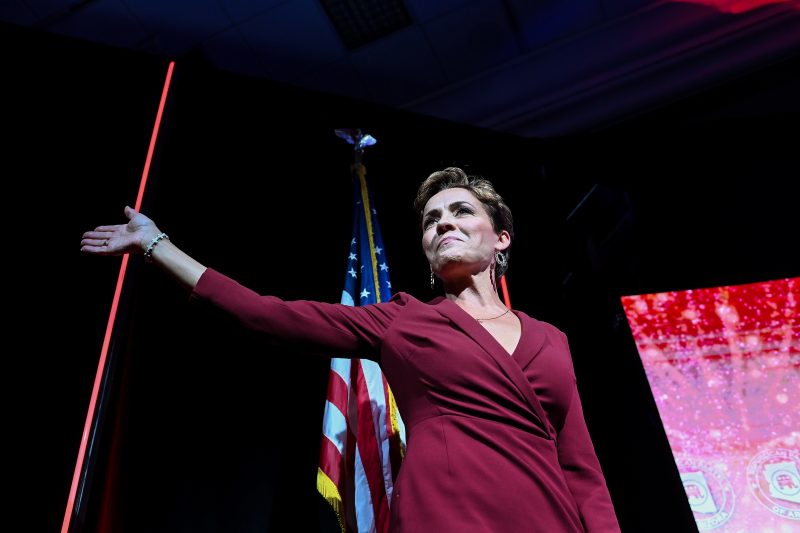Kari Lake, an Arizona ally of former president Donald Trump who has not conceded her defeat to a Democrat during last year’s gubernatorial race, will enter the race for U.S. Senate on Oct. 10 during a rally with supporters, according to two campaign advisers who spoke on the condition of anonymity to talk about private discussions.
Lake’s looming announcement sets up a Republican primary fight with Mark Lamb, a Phoenix-area sheriff who has struggled to raise money and his profile as the only Republican in the race, which could be crucial in deciding control of the U.S. Senate.
“While she has been everywhere but Arizona, Sheriff Mark Lamb has been serving the people, fighting to secure the border and meeting with voters who deserve a proven, conservative winner,” said Rick Gorka, Lamb’s spokesman. “Kari Lake is a loser who cannot win an election in 2024.”
Lake’s decision, first reported by the Wall Street Journal, brings a new dynamic to the battle for the seat, now held by Sen. Kyrsten Sinema (I), who left the Democratic Party last year and has not yet said whether she is running for reelection, and Rep. Ruben Gallego, the lone Democrat in the race.
News of Lake’s decision to run for the Senate seat comes the same day President Biden was in the state to deliver a speech about the importance of America’s institutions in preserving democracy, a theme central to his presidency and reelection campaign. He also honored the late Sen. John McCain (R-Ariz.), his friend who served more than 30 years in the Senate and was his party’s nominee for president in 2008.
Lake, a former TV newscaster, embraced Trump’s style of politics during her 2022 race for governor, during which she torched her GOP rivals, focused heavily on false claims of fraud in the 2020 election and then lambasted Democrat Katie Hobbs, who won the election by an estimated 17,000 votes. Lake continues to contest her loss in court.
The former gubernatorial candidate’s campaign platform hit on several pillars of contemporary conservative politics.
Lake sought to expand school choice and called for the removal of curriculum in schools she referred to as “woke.” She said she wants to dedicate more resources toward avenues that encourage pregnant people to seek alternatives to abortion, such as adoption. On border issues, Lake has said she’s committed to finishing the construction of the U.S.-Mexico border wall and last year said she planned to issue a declaration of “invasion” in her state.
The former gubernatorial candidate also advocated the use of desalination to expand the state’s freshwater supply — a key issue in a state plagued with water issues.
Lake has not backed away from her election denialism since losing the race last year, touring the country fundraising for her lawsuits and publishing a book this summer in which she declared herself “the lawful governor of Arizona.”
Lake is now a fixture of Trump’s orbit, acting recently as his surrogate during the second GOP presidential debate Wednesday. She also traveled to Iowa this year, making a number of false claims in her remarks, including that the 2020 election was stolen from Trump, that votes were rigged against her in Arizona and that future races would be compromised.
Ahead of her anticipated candidacy announcement, Lake is scheduled to travel to D.C., where she will meet with Republican consultant Josh Holmes, a confidant of Senate Minority Leader Mitch McConnell (R-Ky.), a Lake adviser said. She is also expected to meet with the No. 3 Republican in the chamber, Sen. John Barrasso (R-Wyo.). The National Republican Senatorial Committee is helping Lake’s team arrange meetings with other national Republicans, the Lake aide said.
Sen. Steve Daines (R-Mont.), the NRSC chairman, said in a statement that the committee has had productive meetings with Lake and her team.
“She is a talented campaigner with an impressive ability to fire up the grass roots,” Daines said, adding that Republicans “have a clear path to victory.”
Some Arizona Republicans had repeatedly sought to avert Lake’s entry to the race, fearing a lack of broad appeal that could lead to a rerun of a string of elections that had delivered Democrats control of both of Arizona’s Senate seats and most key statewide offices.
During her campaign last year, Lake alienated moderate “McCain Republicans,” who are crucial to statewide campaigns, by telling supporters of the late Republican senator to “get the hell out” of one campaign event.
Lake’s candidacy could benefit Sinema if voters look for an alternative to Lake’s pro-Trump positions and rhetoric ― just as they did with Hobbs in 2022 and with Biden in 2020.
Alternately, during a presidential year that could offer a rematch between Trump and Biden, enough Republican and conservative-leaning independent voters could stick with the conservative ticket, denying Sinema enough votes should she decide to run.
A spokesperson for Sinema declined to comment. The senator has continued to place herself in the middle of major bipartisan legislation and has ramped up her fundraising in and out of the state.
Hannah Goss, a spokesperson for Gallego’s campaign, said Lake’s “extremism should disqualify her from public office — and it will.”

